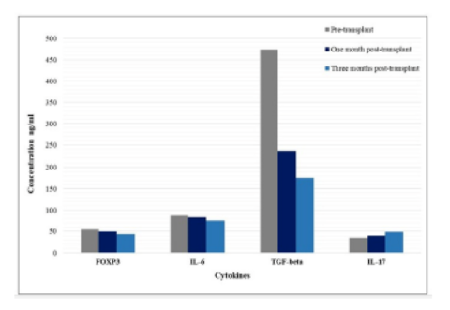


Indian Journal of Science and Technology
Year: 2023, Volume: 16, Issue: 7, Pages: 509-515
Original Article
C Priscilla1, Sreejith Parameswaran2, N Srinivas1, Rajesh Nachiappa Ganesh1*
1Department of Pathology, Jawaharlal Institute of Post Graduate Medical Education and Research (JIPMER), Puducherry, India
2Department of Nephrology, Jawaharlal Institute of Post Graduate Medical Education and Research (JIPMER), Puducherry, India
*Corresponding Author
Email: [email protected]
Received Date:06 December 2022, Accepted Date:24 January 2023, Published Date:23 February 2023
Objectives: Allograft rejection is the most common event that occurs posttransplant and the current diagnostic tools like the measurement of serum creatinine or core kidney biopsy could not serve as a predictive tool and have certain drawbacks. Thus, our target was to find potential, non-invasive, and predictive biomarkers which could identify recipients at the risk of post-transplant allograft rejection. Methods: It is a prospective longitudinal cohort study comprising of 40 live-related kidney transplant recipients whose peripheral blood was collected at three time points viz pre, one and threemonths post-transplant to assess the plasma cytokine levels of FOXP3, IL- 6, IL-17 and TGF-b using Enzyme linked immunosorbent assay (ELISA). The patients were clinically followed for period of two years to determine their posttransplant outcome. Findings: 13 of our recipients had biopsy proven allograft rejection at the end of follow-up period. The pre-transplant concentration of FOXP3 were less in the rejection group whereas the concentration of IL-6, IL- 17 and TGF- b were more in the rejection group (p<0.05). The classification accuracy of the markers FOXP3, TGF- b , IL-17 and IL-6 were assessed and they had an AUC of 1.0, 1.0, 0.96 and 0.84 respectively with high sensitivity, specificity, and statistical significance. Novelty: Pre-transplant levels of plasma cytokines were able to predict recipients at the risk of allograft rejection. Thus, our study confirms the predictive power of our cytokine biomarkers FOXP3, IL- 6, IL-17 and TGF-b and further paves way for personalized immunosuppressive regimen.
Keywords: Predictive Biomarkers; Allograft Rejection; FOXP3; IL6; IL17; TGFb
© 2023 Priscilla et al. This is an open-access article distributed under the terms of the Creative Commons Attribution License, which permits unrestricted use, distribution, and reproduction in any medium, provided the original author and source are credited. Published By Indian Society for Education and Environment (iSee)
Subscribe now for latest articles and news.